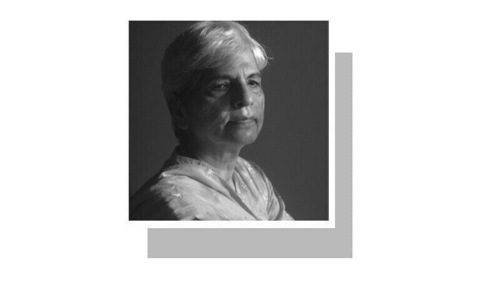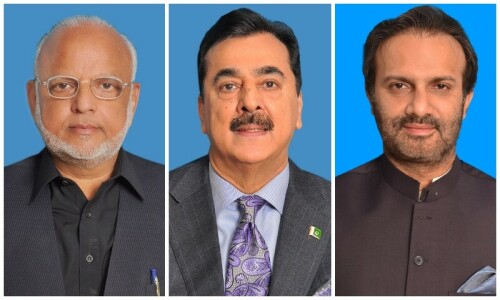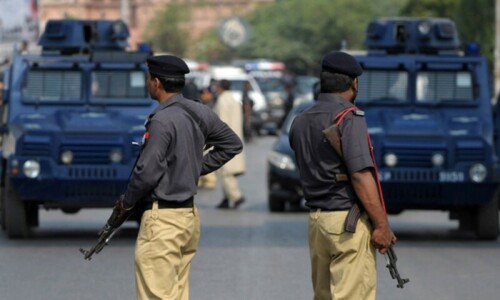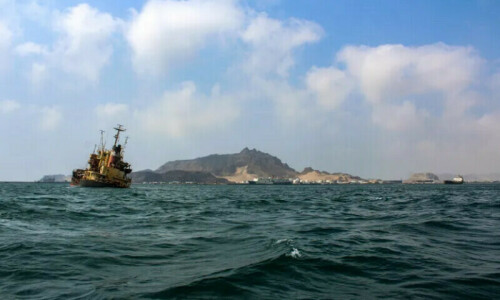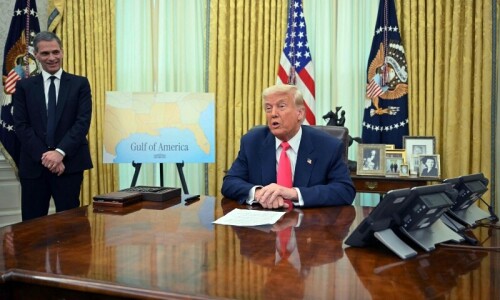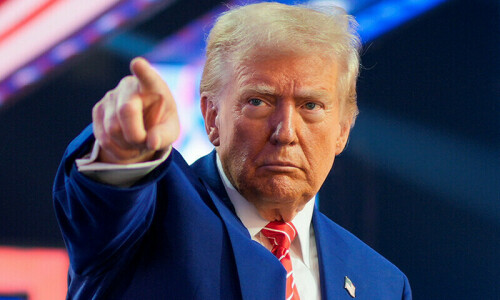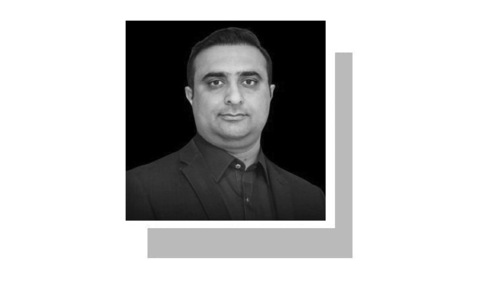Using new aid judiciously
THE country has been served with two vastly different scenarios of the economy of Pakistan to emerge if the war in Afghanistan ends early enough or, in other case, gets prolonged. The official scenario is that of the war ending early enough, and meanwhile the West led by the US and Japan making up for Pakistan’s heavy losses in various ways.
The officials led by finance minister Shaukat Aziz visualize Pakistan emerging far better for that, with much of the external loans of 37 billion dollars written off or re-scheduled on very favourable terms. In the case of some of the debt not written off there will be a swap which will enable Pakistan to use a part of that for developing the social sector and poverty reduction — two of the most neglected areas of the country.
The other stark scenario, which has minority support, envisages the war lasting for long and the coalition led by the US eventually becoming frustrated and getting out of it, and going home with its B-52 bombers and fleet of aircraft carriers. And Pakistan will be far worse, for being abandoned a second time by the West, the first after the Russians left by 1989. This scenario has the people eventually turning against the military-led government with as much fury as deep despair, and a feeling of remorse over letting Afghanistan being bombed too heavily by the US and Britain.
Those who speak of the second scenario do not see the whole picture and do not realise Pakistan has hardly any other option when the Taliban has no other country in the world backing it, and after the UN came out strongly against terrorism. As far as Pakistan is concerned, India jumped the gun by placing all its defence facilities at the disposal of the US immediately after September 11 and after the Taliban brushed aside all the advice tendered by Pakistan for their own good.
In such a context the West cannot now just walk away if the war is prolonged and the Taliban still in control of Afghanistan along with the Al Qaeda network of Osama bin Laden remaining unaffected. Instead the pattern of war many change. Rather than drop 5,000 pound bombs the US may opt for a more ingenious guerilla warfare and use a great deal of money to get hold of the Taliban rulers and the Al Qaeda network. Anyway they will not want another set of Taliban to follow the present set when they oppose even the so-called moderate Taliban, if there are many, to be part of the future government with its total ethnic mix.
Of course, if the war lasts in the present form Pakistan will suffer a great deal not only financially and materially but also emotionally or psychologically. The rift between the peoples of Pakistan and Afghanistan will also widen further.
Meanwhile a number of people in the economic sector want Pakistan to get not only as much economic assistance as possible from the West but also make full and proper use of that aid. The fact is that after having received 60 billion dollars of total external aid so far the country’s economy is in bad shape and it still owes an external debt of 37 billion dollars. And even if the external debt is now considerably adjusted, there is the domestic debt of Rs 1,783 billion which is not repaid year after year but accumulated increasingly. And its interest cost alone this year is Rs. 198 billion, while the interest cost of the much cheaper foreign debt is Rs 62 billion.
The situation is so critical that while it is safe to have total debt equal to 60 per cent of the GDP for a country Pakistan total debt of 115.5 per cent of the GDP is almost a double of that, with foreign debt forming 64 per cent of that following the sustained devaluation of the rupee with its varied fall-out.
And in per capita terms, as the State Bank’s Annual Report for 2000-2001 shows, if the per capita income of a Pakistani is Rs 25,000 in a year his per capita debt is Rs 29,000. And it remains static as economic growth rate since 1995 has been very poor. If the per capita income has been very disappointing, it becomes far less in global terms because of the steady and heavy devaluation of the rupee, which has abated for the time being.
Hence the urgency for reducing the crushing debt burden wherever possible, beginning with the external debt. As the loans provided by the people in the form of their savings could not be written off or reduced or repaid in the present context, the State Bank is trying to reduce the interest rate to the dismay of the poor savers. The extra reason advanced by the State Bank is that the rate of inflation has come down and interest rates hence must reflect that. But the people don’t see that inflation has really come down. All that the people see is that inflation has stabilized at a very high level, and the rise in inflation for the middle class and above is very high due to the high utility rates and transportation costs.
In such a predicament Shaukat Aziz is rushing to one world capital to another while many of the Western leaders are visiting Pakistan to meet Gen. Pervez Musharraf. He is seeking four kinds of assistance. 1. Outright financial grants like the 800 million dollars indicated by the US starting with the 100 million dollars. 2, Debt relief through write-off or rescheduling on very favourable terms or converting them into grants for social sector development and poverty reduction. 3. Far larger assistance by the IMF, World Bank and Asian Development Bank. 4. Larger market access for Pakistani exports, like the 15 per cent additional quota granted by the European Community and more by the US.
Canada has agreed to let its debt of 378 million dollars be converted into assistance for social sector development and poverty reduction. Britain has written off a large part of its debt of 84 million dollars. And the Netherlands has written off the loans of 16 million dollars we were to repay in two years.
Some persons in Pakistan had begun re-echoing the old slogan “more trade not aid.” But the problem of Pakistan is so critical we need not only more trade and more aid, but also aid in various forms — both writing off and rescheduling old loans, and new grants.
The fact is Pakistan has been caught in a welter of sanctions over a long period since 1990 when the US imposed its sanction to prevent it from making any headway in the nuclear field. And after the Pressler, Symington and Glenn Amendments over the years came the blanket sanction when Pakistan exploded its nuclear devices in May, 1998. More sanctions came after the military take-over of 1999. And what the US did was followed by the Commonwealth and in most of the areas by Japan. Meanwhile Pakistan had to repay the loans as agreed earlier, and it was hence forced to buy almost 3.5 billion dollars from the open market. This situation could not have continued for long.
So those who advocate a different course from what the government has followed without specifying what it should be, do not realise the gravity or complexity of the economic situation Pakistan has been facing. And Pakistan should feel good for the last of the US sanctions were written off by President Bush on Saturday.
The US now says it is striving for a total package of 8 billion dollars over a three year period from the IMF, World Bank and the Asian Development Bank, and as bilateral assistance. And that would include one billion dollar of its own assistance in various forms and a far larger Poverty Reduction and Growth Facility Package that envisaged earlier.
It also wants to write off the 3 billion dollars of bilateral debt which Pakistan has to pay, and is consulting Japan to whom we have to repay 5 billion dollars. Meanwhile Japan has lifted the sanctions it had imposed following the nuclear explosions of May 1998. And larger assistance will be coming forth following the visit of Shaukat Aziz to Tokyo.
There is some impatience in non-official quarters regarding the speed in providing new aid or writing off old loans. What such critics do not realise is that foreign countries with their powerful parliaments, constitution and legal systems cannot act in the manner authoritarian governments function.
Hence the full flow of aid will take quite some time. Meanwhile the donor states are having consultations in this regard so that they can come up with a well coordinated aid and make full use of multilateral financial organizations like the IMF, World Bank and Asian Development Bank who know Pakistan too well.
The government feels proud it has been able to implement the stand-by agreement with the IMF in full unlike previous regimes which scraped them midway. But the fact is the stand-by agreement had only a nine-month duration with a total loan of 596 million dollars. The other normal arrangements with the IMF had a three-year duration.
But if the world wants to give large assistance through the IMF, the World Bank and the ADB, like WB’s 300 million dollars for banking reform, or ADB’s 300 million dollars for corporate sector reforms and 350 million dollars for agricultural reforms, they also want strict control over the use of the money. They do not want to the money to go down the drain or into the pockets of the officials in charge of such programmes.
Much of the old loans written off is to be used for social sector development and poverty reduction. Corruption in these areas in the past has been very large. Hence the increase in literacy in the country or improvement in the quality of education has been very small. The Social Action Programme II has its plethora of scandals, like its predecessor SAP I.
How well are the National Accountability Bureau and other anti-corruption agencies and provincial departments geared to achieve far better results and maximum output for every rupee invested? Borrowed money put to bad use will be too tragic.
Afghan crisis and debt write-off
THE expected has begun. Afghanistan is proving to be anything but soft yielding putty in the face of American military might, and wrath. More and more bombs are missing their military targets and killing civilians instead.
Already, there is talk of possibly never finding Osama. The State Department and the Pentagon insist on portraying everything as going-as-planned, while ground realities indicate to the contrary. The military victories are slow in coming and the political ones, none so far.
The Pakistan government, whose retooled Afghan policy banks heavily on a swift military defeat for the Taliban, is feeling the growing heat in the domestic kitchen. Public sentiment is stirring with increased footage of mounting civilian casualties inside Afghanistan. Already, one of the worst case scenarios has started playing out in the NWFP in an audaciously bold challenge to the Pakistan government’s authority.
No less than a 100-truck convoy, carrying thousands of gun-brandishing would-be jihadis has been sent on its way to the Pak-Afghan border by hard-line religious and tribal elders. The boldness of the move clearly caught the government off-guard as it was lured into a false sense of complacency by lower than expected turnouts in pro-Taliban rallies.
Instead of taking a tough stance, including the use of force necessary, the government has conveniently passed the buck by allowing the bellicose group of tribesmen and religious militants to move to the Afghan border — only to be stopped by the Taliban who have their own apprehensions about them. But how long can the government afford to be seen soft-pedalling when it comes to dealing with open shows of defiance?
The government’s predicament is understandable. It does not want any killings of its own people, which would surely ignite an already explosive situation. At the same time, however, it cannot allow religious hard-liners to dictate terms in matters of law and order. The government has no option but to adopt a political engagement policy and rally the support of the silent majority of people approving its Afghan policy. But it cannot do so without first enlisting the support of the genuine political outfits of the country.
The killing of seventeen Christian worshippers has added another alarming dimension to the situation. It would not be a surprise if the coming weeks also witness the killing of some moderate religious and anti-Taliban Pakistani politicians and intellectuals, adding to the growing apprehension of the people.
The Bahawalpur massacre could well have been RAW engineered by as India is bitterly disappointed at the fast improving relations between Pakistan and the predominantly Christian West. And what better spoiler than portraying Pakistan as a fanatic-loving and Christian-hating country? Whatever be the identities of the perpetuators of this crime, the fact remains that the give some incident repercussions on the country.
So where does the government go from here? The truth is it does not have many options so far as its international commitments are concerned, but it can do a lot more on the domestic front. To begin with, it needs to stop opening new fronts and closing down many of the older ones, particularly those against the political forces of the country. The change of guard in Punjab indicates that Islamabad may just be inclined towards taking such a line even if no action is taken at this moment. The announced round of meetings between President Musharraf and political leaders could prove a watershed both for the stability of the country and the Musharraf regime itself.
The past rounds of such meetings had roused misplaced hopes about the government wanting to involve some politicians and political parties in state affairs. Nothing, but greater animosity came out of those talks as most of the politicians felt rather humiliated and used by the manner in which they were called over by the president and then simply forgotten about. The president needs to realize that in the coming days, even if his road map for democracy is delayed for a while, it is these political elements that are his ultimate and permanent constituency.
It is this constituency that he must take along today, if he wants to be taken along by them in the future. He must surely know that once this new Afghan crisis is over or at least it reaches manageable levels, the West, including the US will start pressing general Musharraf for a return to democracy.
Today, he can dictate the terms of a future relationship with the political parties; tomorrow it could be a totally changed set of power realities which may not entirely be to his liking. It has happened before; it can happen again.
The time has also come for the government to lean more heavily on its western benefactors. The political fallout of Abdul Haq’s execution has exposed the fact that the Americans are a long way from cobbling together a political alternative to the Taliban regime. They must be made to realize that if their plans can get so badly damaged by the elimination of one man, then the consequences of an anti-terrorism alliance without Pakistan would be catastrophic. And this scenario cannot be shrugged off if the American-led alliance does not stop being measly about giving real financial assistance to Pakistan. Public anger is rising while the economy is slipping.
Unless the Musharraf government can face the nation with a massive debt relief package, which would translate into perceptible economic relief, public opinion will be increasingly commandeered by religious extremists. The government needs to, at least, justify its pro-West stance in terms of economic benefits if not on moral grounds.
Debt rescheduling is not enough of a recompense. The West either does a serious debt write-off for Pakistan or forget about Afghanistan. It has to be a massive write-off if the West, the US in particular, wants to see Musharraf government stay firmly in the saddle and behind the US initiative. Any change of guard in Pakistan, even within the next couple of years, would definitely be to the detriment of the global war against terrorism.
Mistrust in the West
IT MAY be hard, with bearded rioters filling their televisions, for westerners to see Pakistan as a bride left at the altar. But that is how many Pakistanis view their relationship with the fickle West, and they have good reason to do so.
In the 1980s, when Pakistan signed up as America’s ally in the West’s last war in Afghanistan, the war against the Soviets, Pakistan was rewarded with billions of dollars of military hardware and economic aid. But Pakistan paid a price: heroin flooded our cities, Kalashnikovs became common on our streets and young boys were left trained for jihad instead of university.
When the Soviets were defeated, Pakistan did not share in the long-awaited peace dividend. Although the country was making its transition from dictatorship to democracy, aid began to dwindle and the rhetoric of western governments became increasingly unfriendly. Pakistan was left with training camps for religious guerrillas, a mountain of debt, two million Afghan refugees and little else.
Certainly, Pakistan’s own leaders bear much of the blame. Corrupt, ineffectual and often deeply hypocritical, the governments of Benazir Bhutto and Nawaz Sharif tried to go forward and backward at once, burnishing their religious credentials while hoping to attract western investors.
But, at the same time, the West did recoil from us with unseemly haste once its war was won. It began treating Pakistan like an impoverished Muslim nation with no oil to export. But Pakistan had been this all along. To ignore a girl’s hairy moles the night before, when one’s need is strong, and then to shame her for them in the morning, well, as the Texans say, that’s not real nice.
It is not surprising that most Pakistanis do not support America’s bombardment of Afghanistan. The Afghans are neighbours on the brink of starvation and devastated by war. America has shown itself to be untrustworthy, a superpower that uses its values as a scabbard for its sword. Avenging the horrible deaths of thousands by putting millions more at risk is an act deeply lacking in compassion, and one unlikely to reduce the hatred that makes America unsafe.
Yet, forced to decide whether to back their government in a showdown with our own religious extremists, most Pakistanis are clear about the future they desire. They do not want a medieval theocracy. They want jobs and access to the markets and knowledge and entertainment of the wider world.
What many in the West do not realize is that Pakistan is a land where satellite dishes are not uncommon, where teenagers who have never been to America manage to smuggle in bits and pieces of American accents. In the decade of democracy that lasted through the ‘90s, religious parties never captured more than a few per cent of the vote.
But when the economy is stagnant, democracy has sputtered out and growing numbers of young people find themselves ill-equipped for a workforce that they in any case lack the right connections to enter, then the appeal of an Islamist ideology that challenges these injustices grows strong.
Pakistan is making a dangerous gamble by confronting its religious right. The country is betting that it will not be torn in two, that its leader will not be assassinated, that it will not be plunged into anarchy.
Now that it has taken this risk, the country needs the West to stand firm beside it. Not by providing weaponry. Not even by rescheduling debt, though that, of course, will help. What Pakistan mainly needs is the openness that comes when fear recedes, but Pakistan needs that openness now, when the West is still fearful. Pakistanis need jobs. We need access to purchasers for our goods, investors in our industries. With these things come greater growth and stability, which then become self-reinforcing.
Pakistan needs a partnership to start this process, a coming together for the long term. Without it, the three million people who swell our population each year will sink deeper into poverty, and the ideologies that appeal to memories of a better past will gain appeal.
The writer is a well known novelist living in the US
Chechnya is different
PRESIDENT Vladimir Putin has made remarkable progress in his campaign to conflate his brutal military campaign in Chechnya with the new US-led war against terrorism. President Bush publicly agreed with Putin that terrorists with ties to Osama bin Laden are fighting Russian forces in the predominantly Muslim republic, and said they should be “brought to justice.” Since then the Bush administration quietly has begun taking concrete action in support of Moscow.
It delivered a tough message to the exiled Chechen foreign minister demanding that the rebel leadership break off relations with two Chechen commanders who represent the movement’s radical Islamic faction.
Mr Putin would like the world to believe that the US steps are equivalent to his own support for a US offensive against Osama bin Laden and the Taliban regime in Afghanistan. But they are not; and before the Bush administration goes further in backing Putin’s policies in Chechnya, it is worth reviewing why that conflict, and the terrorism associated with it, are different. Chechnya is not a terrorist syndicate or an Islamic movement but a nation that was conquered by Russia in the 19th century and that for more than a decade has been seeking to regain self-rule.
Its leader, Aslan Maskhadov, is not an Islamic extremist or even a man of arms but a pro-Western politician who was democratically elected in 1997, two years before Putin chose to reverse a peace accord by sending 80,000 Russian troops to invade the republic.
Most important, the most brutal atrocities of the Chechen conflict — a fight that could have been avoided had Russia been willing to grant self-rule to this subject nation — have been perpetrated not by international terrorists or the Chechen rebels but by Putin’s own Russian forces. Russian and Western human rights groups have extensively and meticulously documented hundreds of war crimes by Russian troops, including extrajudicial executions, torture, extortion and the reduction to rubble of Chechen towns with indiscriminate bombing and shelling. —The Washington Post.
It’s only a film
SOME years back, I wrote a piece about taking my son on to a movie about World War II. I explained that in the movie the Germans were the bad guys, but now they are good guys. The Russians were good guys during the war, but because they wanted to kick the Germans out of Berlin after the war, they became the bad guys.
I thought about this recently when I took my 10-year old grandson to the movies. It was one of those bloody, shoot-’em-up films with all the bad guys blasting the good guys and then, at the end, the good guys wasting the bad guys. When we walked out, I asked him, “How could you stand all that violence?”
He replied, “Grandpa, it’s only a movie.”
I turned on the television a few weeks later and said, “This is not a movie you’re watching but the real thing.”
He looked at the screen and said, “Where are the bad guys?”
“They are all dead. They all committed suicide but they took so many good guys with them. They were terrorists.”
He kept looking at the screen.
Then he said, “In the movies the good guys always kill the bad guys at the end.”
“The reason Hollywood made so many violent films is because the young people who wanted them knew it was only a movie. Americans got their kicks from violence on the screen and on TV. The kids loved it. We never thought we would see the real thing on the evening news.”
“Are all the bad guys dead?”
“The ones who did it are dead. But we have to find the bad guys who planned all of it and are still alive. Maybe someday we will kill them.”
“I’ll bet James Bond could find them.”
I said, “James Bond would have a tough time doing it even with all his lethal toys.”
“I’ve seen Arnold Schwarzenegger throw 100 guys off a cliff.”
“Yes, he did that, but Arnold would have as much trouble throwing these bad guys off the cliffs as the CIA.”
“What about Bruce Willis?”
“He can’t do it either. No one in Hollywood can do it.”
He said, “Does this mean that they are not going to make any movies where lots of people get killed?”
“Not for a while. What you are seeing now is too much for any of us to absorb.”
“Where are the bad guys now?”
“They are everywhere and nowhere. No one knows how to play this one, and never will. What you are watching is not a film but history.”
My grandson became very quiet.
He said, “It won’t be like it used to be, Grandpa.”
I told him, “It will be different and so will we.” —Dawn/Tribune Media Services
Fears of a more combative society: WASHINGTON NOTEBOOK
EVERYWHERE you go, the questions are becoming more pointed, more pressing. Where is the military campaign in Afghanistan headed? Has it met any of its objectives? How long will it continue?
There’s a noticeable gap between official statements and public perceptions. The briefers at Pentagon yeomanly plough ahead with claims that the war is going well and as expected. But not a single notable Taliban or Al Qaeda leader has been killed or captured in four weeks. It is not clear whether, despite General Pervez Musharraf’s claim to this effect the other day, the Taliban have actually split. The one leading Afghan leader killed is commander Abdul Haq, who had gone into southern Afghanistan to engineer a division in Taliban ranks.
“I would be dumbfounded if everyone agreed with what we say,” Defence Secretary Donald Rumsfeld said on Tuesday. But scepticism is taking hold of newspaper pundits. Some are even beginning to wonder whether the military campaign was well thought through before it was undertaken. President George Bush’s ratings remain high, but the situation could change if visible signs of success do not quickly become apparent. This is their last war, the wags say, alluding to Rumsfeld and Vice-President Richard Cheney, the Gulf War veterans. There is clamour to abandon “half measures”, put in ground troops and go for the kill. “This a time for righteous might”, proclaims one op-ed piece.
In Britain and elsewhere in Europe, even the very idea of the US pounding Afghanistan day after day is beginning to come in for increasing criticism, and there have also been impressive peace demonstrations. John Pilger, the former chief foreign correspondent of the nominally left-wing British newspaper the Daily Mirror, sees one of the world’s most stricken nations terrorized by the world’s most powerful.
(However, some of the present attitudes of the mainstream British press must be taken with a pinch of salt. Notwithstanding Tony Blair’s loyalty to Washington, it is not really Britain’s war: it will be America that will get the credit for success and which will have to bear the responsibility for failure. During the conflict over the Falklands, we had all seen how the British press was swept off its feet by the Thatcher wave of patriotism and jingoism.)
The failure so far to achieve agreement on a post-Taliban administration has slowed down the effort to fashion a coherent political strategy. America appears determined to maintain its pressure till the Kabul regime gives, but the tugs and pulls in various different directions over a new administration in Afghanistan comprise just one indication of the conflicts in that dangerous region. The political context is not being fully grasped.
Domestically, the war against terrorism has led to steps that spell trouble for ordinary citizens, particularly those of foreign origin. First, there was this month’s anti-terrorism law, grandiloquently titled as “Uniting and Strengthening America by Providing Appropriate Tools Required to Intercept and Obstruct Terrorism (or USA PATRIOT) Act”. This was followed by the announcement of stringent checks on immigrants and students and the setting up of a Foreign Terrorist Tracking Task Force.
Many think the inclusion of the word “terrorist” is a mere formality: they believe the task force will actually be a surveillance body for foreigners of specific origins and nationalities and ideologies, giving birth perhaps to a trend towards neo-McCarthyism. Because of where you come from, you may be considered a potential terrorist unless you can prove otherwise.
The PATRIOT legislation was not passed without opposition in the House of Representatives. Sixty-two Democrats, three Republicans and one independent voted against it. In the Senate, however, Democrat Russ Feingold’s was the only voice of opposition. Outside Congress, civil rights groups have castigated the Bush administration and the legislature for adopting such a harsh measure. “Rare are the moments in history when Congress has surrendered so many cherished freedoms in a single trip to the altar of immediate fears,” one critic has said.
Laura Murphy, director of the Washington national office of the American Civil Liberties Union, asserts that the law is “light years beyond what is necessary to control terrorism. Included in the bill are provisions that would allow for the mistreatment of immigrants, the suppression of dissent and the investigation and surveillance of wholly innocent Americans.”
What does the act do? The independent weekly Nation has it down pat: the law minimizes judicial surveillance of telephone and internet surveillance; expands the government’s ability to conduct secret searches; permits the attorney-general to incarcerate or detain non-citizens based on mere suspicion, and to deny re-admission to the US of non-citizens (including lawful permanent residents) for engaging in speech protected by the First Amendment; and makes payment of membership dues to political organizations (presumably those considered undesirable by the establishment) a deportable offence.
It also in effect puts the CIA and other intelligence agencies back in the business of spying on Americans, and allows student records to be searched based on a very low standard of relevancy to an investigation. The legislation creates a broad new definition of domestic terrorism that could target people who engage in acts of political protest. Even a day’s overstay by a visa holder can result in immediate deportation.
There have been other repercussions. The Michigan area houses a large number of Arab Americans, particularly the city of Detroit, and a previously classified report compiled by the city’s police over two years and recently released describes Detroit as a major centre for many terrorist groups. It says most of the 28 terrorist groups identified by the State Department are represented in Michigan.
Inevitably, the report has led to resentment among Arab American groups, most of which are politically active. The police chief is said to have regretted the report’s implication, but it nevertheless reflects the police outlook on immigrants and immigrant groups.
A debate has also erupted between Muslim associations and the American Jewish Committee, which carried out a survey that questions the generally accepted estimate of 6.7 million for the US Muslim population, saying the estimate is way off. The survey suggests that the actual numbers would range between 1.9 million to 2.8 million. The American Muslim Council argues that this is a move by the Jewish establishment to lessen the political importance being given to the Muslim community in the wake of the September 11 attacks. But the council has yet to come out with a scientific survey of its own, repeating charges of a Zionist conspiracy.
You look around, and you fear that America may become an extremely combative society. Periods of political and economic adversity and stress often have a tendency to aggravate prejudices.
NOW, something a little different — or not entirely so, perhaps. Israeli Foreign Minister Shimon Peres was in Washington last week. In an interview with The Washington Post and Newsweek, he was asked for a comment on reports that President Bush had told him that Israel should pull out of Palestinian-controlled areas that it had re-taken following the assassination of an Israeli cabinet minister. Mr Peres replied:
“I said we don’t intend to remain there. The president modified the State Department declaration to pull out ‘immediately’, and said (pull out) as soon as possible. I told him we understand your strategy. As a good Jewish boy, I would have never dreamed that I would pray for the safety of (Gen Pervez) Musharraf, the president of Pakistan. That is a most unexpected experience. But we understand and don’t want to have an agenda of our own.”
THE Washington-based CGIAR, Consultative Group on International Agricultural Research, is currently holding a conference to assess progress made by various centres around the world that it supports. The conference is also being attended by donor countries which want to find out how their help is contributing to poverty reduction and food security.
Pakistan is represented by Dr Kausar Malik, Member, Biosciences, Pakistan Atomic Energy Commission and a member of the board of trustees of the Stockholm-headquartered International Foundation for Science. Some of us spent a pleasant evening with him this week, talking less about his work or the conference he has come to attend and more about his father, the well-known political activist, writer and journalist Abdulla Malik who is now engaged in writing his autobiography in the salubrious setting of his Model Town house in Lahore.




